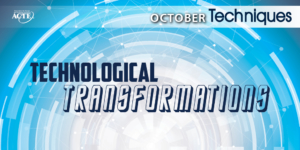Have you heard about the engineer who designed a plastic extractor to comb beach sand in California? Or the climate scientists who are studying the water levels at Lake Mead? How about the ecologist who figured out that the oldest trees in the woods are the ones holding on to the most carbon? Well, for career and technical education (CTE) students who attend Minuteman High School’s Environmental Technology program in Lexington, Massachusetts, these are just three of the many topics they consider and discuss on World News Wednesday (WNW).
WNW is a weekly literacy assignment during which CTE students arrive prepared to give a short talk on a subject related to the unit being covered. Prior to class, they must find and read a news article from a credible source, identify three main points, and define five of the most relevant vocabulary words. Then, once in class, they take turns presenting to their peers and notating others’ main ideas. A lively discussion usually occurs as students ask questions, make connections and challenge ideas from the readings they’ve done.
Authentic reading >amp; writing
CTE educators often find it challenging to bring reading and writing into their classrooms in an authentic way. Secondary students learning in career and technical education are in a unique situation regarding literacy, given that texts and materials used are written for adult professionals. Therefore, it is “essential to functioning in the 21st century” that CTE students experience high-quality literacy instruction and practice. Minuteman High School, winner of the Massachusetts Reading Association’s 2020 Exemplary Reading Program Award, has proven a leader in building literacy strategies in the career and technical education classroom.
Promoting and increasing literacy is a schoolwide focus at Minuteman High School and literacy is layered throughout our programs. World News Wednesday has been a cornerstone in our efforts to ensure our students have proficient reading skills. Education professors Jennifer L. Schneider and Rachel Foot explained that “reading comprehension is a vitally important skill for all people, regardless of their profession.” As the workplace and the world are “more saturated with [diverse] types of texts,” CTE education “can have a tremendous impact on students’ literacy engagement and achievement.”
World News Wednesday allows students to make connections between reading, writing, and the real world, which “can engage reluctant readers and, at the same time, improve literacy skills” (Hyslop, 2010).
Education expert Kylene Beers reminded teachers that “rigor resides in our interaction with a text and not in the text itself. A student lost in a book… is reading with far more rigor than the student trudging through a book that makes little sense or a book that is filled with unknown vocabulary and syntax that leaves him convinced he does not like to read.”
World News Wednesday allows students to choose what they read. Experts agree that student choice is powerful in increasing literacy skills and motivation. “Motivating students to read is easier to accomplish when students select their own… because student choice in reading materials develops a love for reading that often lasts a lifetime.”
Taboada Barber et al. (2009) identified the following components of reading motivation. World News Wednesday uses them all.
- Interest
- Perceived control
- Self-efficacy
- Involvement
- Social collaboration
Minuteman High School’s librarian partners with teachers to foster and expand WNW into additional CTE pro.grams. Biotechnology and Health Careers participate in Science in the News, and Culinary assigns Travel and Tourism Tuesdays. Conversations with teachers about independent reading, public speaking, thematic instruction, access to trade publications, and summarizing skills helped to build community buy-in about this crucial literacy practice.
Relevant, engaging instruction through collaboration
Meaningful collaborations occur when school faculty work together on student goals and progress. With an emphasis on student and program literacy goals, teachers across disciplines collaborate to revise and edit materials. Lessons are co-taught and instructors review and evaluate student work and provide feedback together. Collaborative partnerships help remind staff and students of the relevance and impact of the library program. And this work can help spread enthusiasm for future partnerships with other educators.
Faculty can also use technology, along with media literacy and website evaluation instruction, to guide students. Digital pathfinder tools such as LibGuides, Padlet, and Wakelet provide organization and ease of access to resources. In conclusion, allowing students choice and frequent practice with literacy assignments in real-world scenarios will have positive long-term effects. And you just might learn something along the way.
Emily Kotwal is an environmental technology instructor at Minuteman High School with a background in marine ecology research.
Kara Gleason is Minuteman’s library media specialist. Before this, she was a high school history teacher for more than 15 years.
Shantel Schonour is the literacy specialist at Minuteman High School. She also teaches reading and English classes for ninth and tenth graders.








